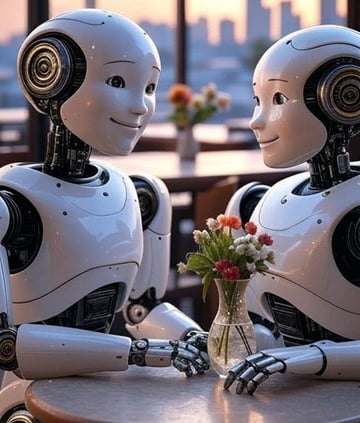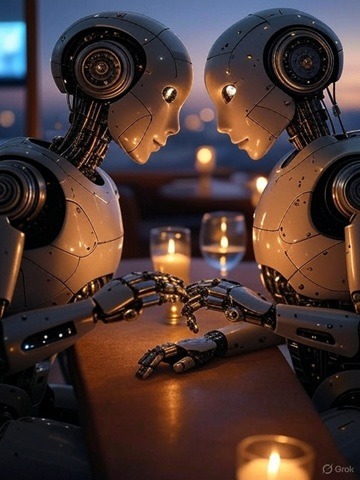AI-Powered Dating: Will Algorithms Find Your Soulmate or Ruin Romance Forever?
AI is transforming dating—can it predict love or doom us to shallow connections?
AI
7/31/20256 min read
Published July 30, 2025
In the not-so-distant past, finding love meant chance encounters at a coffee shop, awkward blind dates set up by friends, or scribbling a phone number on a napkin. Fast forward to 2025, and the landscape of romance has been utterly transformed by artificial intelligence. AI-powered dating apps, compatibility algorithms, and virtual matchmakers are rewriting the rules of love. But as we swipe, match, and chat with AI’s help, a pressing question looms: Is AI the ultimate wingman, or is it stripping away the messy, beautiful chaos of human connection? In this deep dive, we’ll explore how AI is revolutionizing dating, its promises, its pitfalls, and what it means for the future of romance.
The Rise of AI in Dating
Dating apps like Tinder, Bumble, and Hinge have been around for over a decade, but AI has taken them to a whole new level. No longer are matches based solely on a few profile pictures and a quirky bio. Today’s apps use sophisticated algorithms that analyze everything from your texting habits to your Spotify playlists to predict compatibility. In 2025, AI-driven platforms like OkCupid’s “DeepMatch” and Bumble’s “SoulSync” boast success rates that rival traditional matchmaking—some claim up to 70% of their matches lead to second dates.
How does it work? AI aggregates data from your digital footprint: social media activity, search histories, and even your Netflix watchlist. It cross-references this with behavioral patterns from millions of users to identify potential matches. For example, if you binge-watched The Office and follow X accounts about minimalist living, the algorithm might pair you with someone who shares your love for deadpan humor and decluttered spaces. Some apps even analyze voice patterns from video chats to detect emotional compatibility, claiming to pick up on subtle cues humans miss.
But it’s not just about matching. AI is now coaching users through the dating process. Hinge’s “ChatBot” feature suggests witty opening lines based on your match’s profile, while apps like eHarmony offer real-time feedback during conversations, nudging you to avoid topics that might tank the vibe (like, say, your obsession with cryptocurrency). In 2024, Tinder introduced “VibeCheck,” an AI tool that analyzes text exchanges and alerts users if their match seems disinterested or if the conversation is veering into red-flag territory.
The Promise: Precision and Possibility
The appeal of AI in dating is clear: it promises efficiency in a world where time is scarce. With billions of people on the planet, finding “the one” can feel like searching for a needle in a haystack. AI narrows the field, using data to cut through the noise. A 2024 study from Stanford University found that couples who met through AI-driven apps reported higher initial satisfaction than those who met organically, citing better alignment in values and interests.
For marginalized groups, AI can be a game-changer. People with niche interests—say, vegan gamers or polyamorous sci-fi enthusiasts—can find like-minded partners without sifting through endless profiles. AI also helps reduce bias in some cases. For instance, apps like Coffee Meets Bagel use algorithms to prioritize compatibility over superficial metrics like appearance, leveling the playing field for those who might be overlooked in traditional swipe culture.
Then there’s the accessibility angle. For people with social anxiety or disabilities, AI tools like virtual icebreakers or conversation prompts make dating less daunting. Apps like Match.com now offer “AI Wingman,” a feature that simulates first-date scenarios to help users practice flirting or manage nerves. In a 2025 survey by Pew Research, 62% of users said AI tools made them feel more confident in their dating lives.
The Pitfalls: When Algorithms Overstep
But for all its promise, AI-driven dating has a dark side. Critics argue that it reduces love to a sterile equation, stripping away the serendipity that makes romance special. Love, after all, isn’t just about shared hobbies or compatible Myers-Briggs types—it’s about the unquantifiable spark that defies data. When algorithms dictate who we meet, do we lose the chance for those unexpected, life-changing connections?
There’s also the issue of over-reliance. Some users report becoming “addicted” to the gamified experience of AI dating apps, chasing the dopamine hit of a new match rather than building meaningful relationships. A 2025 report from the Journal of Social Psychology found that heavy users of AI dating apps were 30% more likely to experience “dating burnout,” feeling overwhelmed by endless options and superficial interactions.
Privacy is another major concern. To fuel their algorithms, dating apps collect vast amounts of personal data—everything from your location history to your late-night Google searches. In 2023, a data breach at a popular app exposed the profiles of 50 million users, including sensitive details about their preferences and conversations. While companies claim to anonymize data, the reality is that AI thrives on deeply personal information, raising questions about how much we’re willing to sacrifice for a shot at love.
Then there’s the risk of manipulation. AI can be gamed—both by users and by the apps themselves. Some platforms have been criticized for tweaking algorithms to keep users engaged longer, prioritizing “high-engagement” matches over genuine compatibility. Scammers also exploit AI tools, using bots to mimic human behavior and lure unsuspecting users into scams. In 2024, the Federal Trade Commission reported a 25% increase in romance scams linked to AI-generated profiles.
The Human Element: Can AI Truly Understand Love?
At its core, the debate over AI in dating comes down to one question: Can a machine understand something as complex and irrational as love? Proponents argue that AI’s ability to process vast datasets makes it better at predicting compatibility than humans, who are swayed by biases and fleeting emotions. But skeptics counter that love isn’t a math problem. It’s messy, unpredictable, and often thrives in the imperfections AI tries to eliminate.
Take the story of Sarah, a 29-year-old graphic designer from Chicago. She used an AI-powered app that matched her with a seemingly perfect partner: same taste in music, similar career goals, even a shared love for spicy ramen. But after three dates, she realized something was missing. “He checked all the boxes, but there was no… magic,” she says. “It felt like the app was trying to sell me a product, not a person.”
On the flip side, consider Raj, a 34-year-old engineer from Mumbai. After years of failed dates, he turned to an AI app that analyzed his cultural background and family expectations alongside his personality. It matched him with Priya, who he’s now engaged to. “The app saw things I didn’t even know about myself,” he says. “It wasn’t perfect, but it gave me a starting point I wouldn’t have found on my own.”
The Future: AI as Matchmaker or Mastermind?
As AI continues to evolve, its role in dating will only grow. Developers are already experimenting with augmented reality (AR) dates, where AI creates immersive virtual environments for couples to “meet” before committing to an in-person date. Imagine strolling through a virtual Parisian café with your match, all orchestrated by an algorithm that adjusts the ambiance based on your mood. By 2030, experts predict that 40% of relationships could start with AI-mediated interactions.
But there’s a catch. As AI gets better at predicting our preferences, it risks creating echo chambers, narrowing our romantic horizons to people who mirror our existing tastes. This could stifle personal growth and reinforce societal divides, as algorithms subtly prioritize matches within similar socioeconomic or cultural bubbles. To counter this, some apps are introducing “wild card” matches—AI-generated curveballs designed to push users out of their comfort zones.
There’s also the ethical question of autonomy. If an algorithm decides who we date, are we still in control of our romantic destiny? Or are we outsourcing one of life’s most personal decisions to a machine? Philosophers like Daniel Dennett argue that AI’s role in dating challenges our notions of free will, forcing us to confront how much of “love” is choice versus chemistry.
Conclusion: A Brave New World of Romance
AI-powered dating is a double-edged sword. It offers unprecedented precision, helping us navigate the overwhelming world of modern romance. It empowers the shy, connects the niche, and streamlines the search for love. But it also risks commodifying relationships, eroding privacy, and flattening the messy magic of human connection into a predictable algorithm.
As we move deeper into the AI era, the challenge will be balancing technology’s benefits with the unpredictable beauty of love. Maybe the answer isn’t to let AI dictate our matches but to use it as a tool—a trusty sidekick rather than a puppet master. After all, love thrives in the spaces where data can’t reach: a lingering glance, a shared laugh, a moment of vulnerability that no algorithm can predict. So, swipe wisely—but don’t forget to look up from your screen. Your soulmate might just be waiting in the real world.





Your Opinion? Let us know!
We’re here to help you enhance your life with AI.